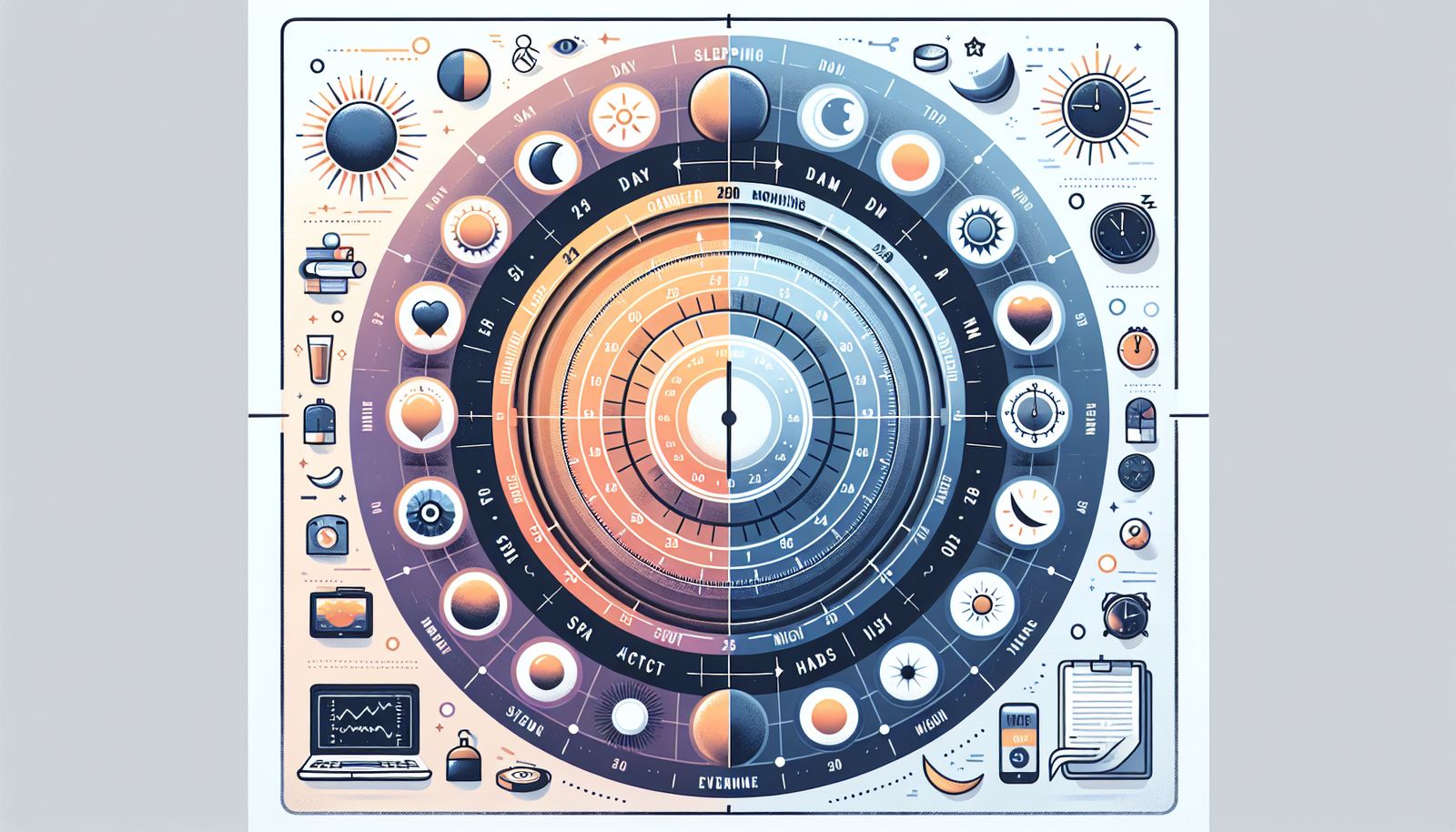Understanding the Circadian Rhythm and Its Impact on Sleep
Understanding the Circadian Rhythm and Its Impact on Sleep
What Is the Circadian Rhythm?
The circadian rhythm is a natural, internal process that regulates the sleep-wake cycle and repeats roughly every 24 hours. This biological clock is influenced by external cues, primarily light and darkness. The term "circadian" comes from the Latin words "circa," meaning "around," and "diem," meaning "day." The circadian rhythm affects various physiological processes, including hormone release, body temperature, and metabolic functions, ultimately playing a crucial role in sleep regulation.
The Mechanisms of Circadian Rhythm
Circadian rhythms are controlled by a group of nerve cells in the brain known as the suprachiasmatic nucleus (SCN), located in the hypothalamus. The SCN receives direct input from the retina about light exposure, enabling the brain to synchronize bodily functions according to the time of day.
When exposed to natural light, the SCN signals the pineal gland to suppress melatonin production, a hormone that promotes sleepiness. Conversely, as darkness falls, melatonin levels rise, making you feel drowsy. This interplay between light exposure and hormone regulation is critical for maintaining a healthy sleep-wake cycle.
Stages of Sleep
Understanding the impact of the circadian rhythm on sleep also involves examining the various stages of sleep, which can be categorized into two primary types: Non-Rapid Eye Movement (NREM) and Rapid Eye Movement (REM) sleep.
-
NREM Sleep: This stage is further divided into three phases:
- Stage 1: Light sleep, a transition between wakefulness and sleep. It lasts a few minutes and involves reduced brain activity.
- Stage 2: Characterized by a further drop in body temperature, heart rate, and brain activity. This stage constitutes about 50% of total sleep time.
- Stage 3: Also known as deep sleep, it is crucial for restorative processes, including muscle growth and repair. During this stage, sleepwalking or night terrors may occur.
- REM Sleep: This stage occurs about 90 minutes after falling asleep and recurs several times throughout the night. It is marked by rapid eye movements, increased brain activity, and vivid dreams. REM sleep plays a vital role in memory consolidation and emotional regulation.
A complete sleep cycle, encompassing all these stages, lasts about 90 to 110 minutes, and typically, a person will experience multiple cycles over the course of a sleep period.
Factors Influencing Circadian Rhythm
Multiple factors can influence the circadian rhythm, leading to sleep disruptions. These include:
-
Light Exposure: Exposure to artificial light, particularly blue light from screens, can impair melatonin production and shift sleep patterns. Proper light management is essential for maintaining a robust circadian rhythm.
-
Shift Work: Individuals who work irregular hours or night shifts often experience circadian misalignment, leading to sleep-related issues such as insomnia and excessive daytime sleepiness.
-
Traveling Across Time Zones: Jet lag is a classic example of circadian rhythm disruption. Traveling east or west can confuse the body’s internal clock, leading to difficulties in falling asleep or waking up.
-
Age: Circadian rhythms can shift with age, resulting in elderly individuals experiencing changes in sleep patterns, such as earlier bedtimes and wake times.
- Lifestyle Choices: Diet, physical activity, and stress levels also play a significant role in circadian synchronization. Poor dietary habits or sedentary lifestyles can disrupt sleep-wake cycles.
The Impact of Circadian Rhythm on Sleep Quality
A well-regulated circadian rhythm is essential for achieving quality sleep. A misaligned circadian clock can lead to a variety of sleep disorders and health issues, including:
-
Insomnia: Difficulty falling or staying asleep often results from disrupted circadian rhythms. Chronic insomnia can lead to significant deterioration in mental and physical health.
-
Sleep Apnea: This condition, often exacerbated by weight fluctuations associated with circadian rhythm misalignment, can lead to fragmented sleep and poor rest quality.
-
Mood Disorders: Irregular sleep patterns linked to disrupted circadian rhythms can contribute to anxiety and depression. Hormonal imbalances due to insufficient sleep can further exacerbate these conditions.
-
Cognitive Impairment: Sleep deprivation associated with circadian misalignment can impair cognitive functions, affecting memory, decision-making, and attention span.
- Metabolic Disorders: Disruption of the circadian rhythm can lead to metabolic issues, including obesity and diabetes, as sleep plays a critical role in regulating the hormones responsible for appetite control, such as ghrelin and leptin.
Strategies to Align Circadian Rhythms for Better Sleep
To enhance sleep quality and support a healthy circadian rhythm, consider implementing the following strategies:
-
Establish a Consistent Sleep Schedule: Go to bed and wake up at the same time every day, even on weekends, to reinforce the body’s natural sleep-wake cycle.
-
Manage Light Exposure: Limit exposure to blue light in the evening by reducing screen time and using blue light filters on devices. Conversely, seek natural light exposure during the day to help establish a healthy rhythm.
-
Create a Sleep-Inducing Environment: Optimize the bedroom for sleep by keeping it dark, quiet, and cool. Consider using blackout curtains and earplugs if necessary.
-
Limit Naps: If you struggle with nighttime sleep, try to limit daytime naps or keep them short—ideally 20-30 minutes—in the early afternoon.
-
Incorporate Regular Exercise: Regular physical activity can help regulate the circadian rhythm, provided it’s not too close to bedtime, which may lead to sleep disruption.
-
Mindful Eating: Maintain a healthy diet, focusing on nutrient-dense foods, while avoiding large meals, caffeine, and alcohol before sleep.
-
Practice Relaxation Techniques: Engage in mindfulness practices such as meditation, deep breathing exercises, or gentle yoga to alleviate stress and prepare the body for sleep.
- Consider Light Therapy: For individuals experiencing circadian disorders, light therapy using specialized devices can help reset the biological clock by mimicking natural sunlight exposure.
Understanding Circadian Rhythm Disorders
Certain conditions specifically pertain to disturbances in the circadian rhythm, including:
-
Circadian Rhythm Sleep-Wake Disorders: These involve persistent patterns of sleep disruption due to misalignment between the individual’s sleep schedule and the societal schedule. Types include Delayed Sleep Phase Disorder (DSPD) and Advanced Sleep Phase Disorder (ASPD).
- Non-24-Hour Sleep-Wake Disorder: This condition often occurs among blind individuals who cannot access natural light cues. Their internal clocks run longer than 24 hours, leading to a gradual shift in sleep times.
The Future of Circadian Rhythm Research
Continued research into circadian rhythms offers promising avenues for understanding sleep and overall health. Investigations into personalized sleep schedules based on genetic predispositions, along with the potential for chronotherapy (timing medications to the body’s biological clock), could revolutionize how sleep-related health issues are addressed.
Furthermore, advancements in wearable technology allow for constant monitoring of sleep patterns and circadian rhythms. This data can empower individuals to make informed decisions towards optimizing their sleep hygiene.
Conclusion
Understanding the intricacies of the circadian rhythm reveals just how deeply interconnected our biology is with the natural world. By taking conscious steps to align our lifestyles with these innate rhythms, we can enhance sleep quality, improve mood, and support overall health. Recognizing and respecting the circadian rhythm is crucial for fostering a healthier society, one where restorative sleep is valued and prioritized.








